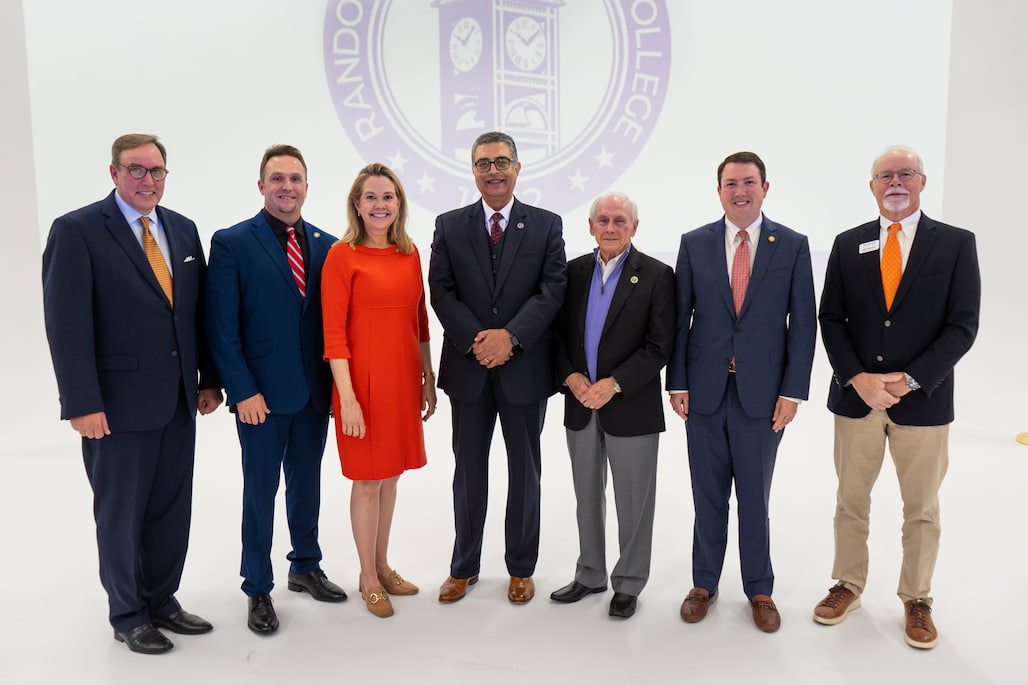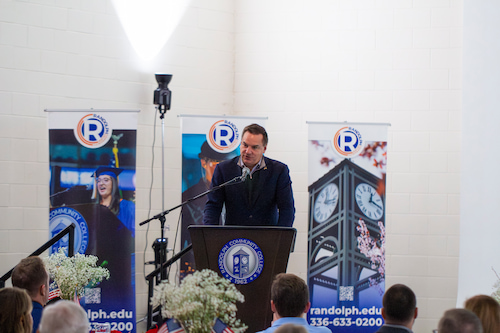RCC highlights workforce leadership, regional growth at President’s Advisory Council and Legislator Appreciation Breakfast

Randolph Community College (RCC) hosted its annual President’s Advisory Council and Legislator Appreciation Breakfast on Tuesday, Nov. 11, in the Photographic Technology Building, bringing together 90 of the most influential elected officials, business executives, and community leaders to discuss the College’s expanding role in workforce development, economic growth, and community partnerships.
The event opened with an invocation and recognition of the legislators in attendance by RCC Board of Trustees Chair Reynolds Lisk. President/CEO Dr. Shah Ardalan followed with a Salute to Veterans and a presentation which emphasized the College’s mission as a driving force for workforce and economic advancement in Randolph County and the greater Piedmont Triad.
“North Carolina continues to be the number one state for business — and Randolph County is at the heart of that growth,” Ardalan said. “With tens of billions in new investment and thousands of jobs being created in our region, Randolph Community College is preparing the talent that fuels this prosperity. Every $1 invested in RCC returns $4.10 in social and economic benefits. If it matters to Randolph, it matters to RCC.”
Dr. Ardalan’s presentation highlighted the region’s population growth, rising job creation, and the importance of aligning education and industry. He shared updates on RCC’s 2024-2030 Strategic Plan; RCC 2.0, centered on being Relevant, Career-focused, and Committed, and the College’s imperatives of Access, Connection, Experience, and Success (ACES).

U.S. Rep. Richard Hudson addresses those in attendance.
Attending the breakfast were U.S. Rep. Richard Hudson, N.C. Sens. Dave Craven and Amy Galey, N.C. Reps. Brian Biggs and Neal Jackson, and Randolph County Commissioners Chair Darrell Frye, who all spoke about the essential role RCC plays in developing a skilled, competitive workforce; the College’s No. 1 state ranking, and the need to support RCC’s expansion.
“Our community college system is North Carolina’s secret weapon,” Hudson said. “Toyota would not have built its factory here without this community college. That is why the Liberty Center is so important. We are going to need that training facility that may need to expand as soon as we build it because we want to help Toyota continue to grow and improve. The only thing that will stop our growth is if we fail to prepare for it. I am proud of this college, proud of this community, and proud of what is ahead.”
Craven echoed those sentiments, noting that community colleges are the reason the state has been ranked No. 1 for business.
“When we invest in community colleges, we’re investing in the workforce that keeps our economy strong,” he said. “North Carolina ranks at the top in talent because of the work happening at community colleges like RCC. We will continue to make investments here. This delegation is on board with the Liberty site.”
Galey noted all the different learners who walk through RCC’s doors.
“This college is all about unlocking potential — with big doors and big arms to welcome everyone,” she said. “Every learner who walks through these doors is here for one reason — to build a better future. RCC is not just about degrees — it is about helping people of every age and ability find purpose and possibility.”
Biggs, who chairs the K-12 and the Educational Appropriations committees, said that investing in RCC is an investment in Randolph County’s future.
“Our dual enrollment programs are giving students purpose — and purpose changes everything,” he said. “We are retooling generations, giving students skills that make them employable, confident, and proud. The next generation does not just need education — it needs purpose. RCC gives them both.”
Jackson lauded Ardalan’s leadership.
“Dr. [Ardalan] is a visionary,” he said. “Every great institution is built on three things: Facilities, innovation, and partnerships. Knowledge used to double every century; now it doubles every 28 days — and RCC is keeping up. If we are going to be the premier institution, not only in this region, but in this country, it takes partnerships. I unashamedly ask you for your support of this institution — yes, that is checks and that is adding zeroes to the end of those checks.”
Frye remembered RCC’s proactive approach to the closure of the Klaussner Furniture plant.
“When factories closed overnight, RCC put people back to work within weeks,” he said. “That is what this college means to our community. This school has helped families make decisions, save money, and change lives. RCC has been a constant — through every generation and every challenge.”
RCC’s presentation also showcased key data from 2024-25, including:
- 9,606 students served and a goal of 10,500 by 2026,
- 2,490 credentials awarded,
- $6 million in state, federal, and RCC scholarships,
- 234 full-time and 400 part-time/adjunct employees.
Ardalan outlined future initiatives — including expansion at the Archdale Center, the new Liberty Education and Workforce Training Center, and the upcoming Applied Industrial AI Center of North Carolina (AI2C-NC) — designed to increase capacity for training and innovation across the region.
“Every number we share represents lives changed,” Ardalan said. “Our mission is simple: Provide quality education at an affordable price. We are building not just students — we are building families, communities, and the future of this county."
###
About Randolph Community College: Randolph Community College (RCC), under the leadership of President/CEO Dr. Shah Ardalan, is committed to providing relevant career training and educational opportunities. Ranked No. 1 in North Carolina by Niche.com, the College offers affordable degrees and short-term certificate programs that start throughout the year, both in person and online. To register for Spring or Summer 2026, visit randolph.edu/register or call 336-633-0200 and expect to engage with the most competent and compassionate team of faculty and staff.